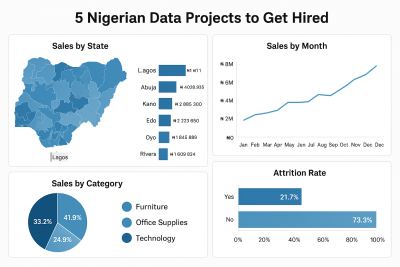
SOPHIA OLISE
 Data Analysis
Data Analysis
 0 comment
0 comment
 27 Aug, 2025
27 Aug, 2025

Landing a data analyst role in today’s competitive job market requires more than technical know-how. Recruiters want to see practical applications that prove your ability to solve real problems. This is where Nigerian data projects can be a game-changer. By working on projects that use local datasets, you demonstrate not only your technical skills but also your understanding of Nigeria’s unique business environment.
Your portfolio is your professional passport, and using Nigerian data makes it more relevant to local employers.
Local Relevance and Recruiter Interest: Employers appreciate projects that connect directly to their business context. A dashboard built on Nigerian sales data, for example, instantly feels more relevant to a recruiter in Lagos than a project using a generic foreign dataset. It shows that you can apply your skills to the specific challenges and opportunities that companies face daily.
Demonstrating Practical Problem-Solving Skills: Beyond visuals and numbers, recruiters want to know you can uncover insights and drive action. When you analyze real-world Nigerian data, you prove that you can handle its messiness, clean it, and turn it into meaningful business recommendations. This positions you as a problem-solver, not just a technician.
This project is an excellent starting point to showcase foundational data skills. Start by cleaning raw sales files; removing duplicates, correcting date formats, and standardizing product names. This initial step shows your ability to manage unstructured data, which is a critical skill for any data role. Afterward, build an interactive dashboard in Excel or Power BI. Highlight key metrics like top-performing states, identify seasonal sales patterns, and analyze which product categories are most profitable. Add slicers and filters to allow for dynamic exploration, a feature that recruiters love to see.
This project is great for demonstrating your ability to work with open government data. Leverage data from the National Bureau of Statistics (NBS) to study employment and unemployment rates. You can break down the data by industry to reveal growth areas and highlight regional disparities in job demand. To stand out even more, use predictive analysis to forecast which skills will be in high demand over the next few years. This shows your ability to go beyond descriptive analytics and anticipate workforce needs, a highly valued skill for employers.
For those interested in social impact, this project is both meaningful and impressive. By analyzing public health data, you can uncover patterns in disease outbreaks such as malaria or cholera. Visualizing this information by region can help reveal hotspots and trends. You can also take it further by creating predictive models. For instance, you could estimate the number of hospital beds or resources needed during peak seasons. These projects show you can combine technical expertise with a desire to solve real-world problems.
Anyone who has experienced Lagos traffic knows it is a data-rich challenge. By analyzing transportation or traffic API datasets, you can identify peak congestion hours, accident hotspots, and commuter behavior. Once the analysis is complete, present recommendations such as route optimization or policy changes. A project like this highlights both analytical and creative problem-solving skills, showing recruiters you can move from numbers to meaningful action.
Employee retention remains a critical challenge for many organizations. Using an HR attrition dataset, you can explore why staff members leave their jobs. Analyze factors like workload, salary, and job satisfaction to uncover patterns in employee turnover. Next, build predictive models that identify employees most likely to leave in the near future. This project demonstrates not only data skills but also business acumen—a key quality for any data professional.
You don’t need to search far for datasets. Nigerian-focused data is available from reliable sources:
For tools, start with Excel for cleaning and Power BI or Tableau for dashboards. For advanced analysis, use Python with libraries like Pandas, Matplotlib, and Scikit-learn.
Structure for Clarity: Document your entire workflow. Begin with a problem statement, show your process, and finish with actionable insights. This proves to recruiters that you can think like a professional.
Write Case Studies: Don't just share code. Turn each project into a case study on your portfolio or GitHub. Walk through your thinking, highlight key visuals, and explain the business impact of your findings.
In a competitive job market, the right projects can make you stand out. By working on Nigerian data projects, you not only showcase your technical ability but also prove you can solve relevant, real-world problems that matter to employers. This approach can set you apart and get you noticed.
Ready to take your portfolio to the next level? Take any advanced data analytics course on ECR Academy and learn step-by-step how to build powerful Nigerian data projects that impress recruiters and help you land your dream job in data analytics.
Retail sales, job postings, HR attrition, and demographic data from NBS are beginner-friendly and highly relevant.
You can explore NBS, Open AFRICA, Kaggle, Lagos Bureau of Statistics, and World Bank open data portals.
Excel and Power BI are great for beginners. Intermediate learners can move into Python and SQL for deeper insights.
Use GitHub, Medium, or LinkedIn. Include visuals, a clear workflow, and explain how your findings impact decision-making.
SOPHIA OLISE
Data Analyst
Olise Sophia Amarachi is a passionate and purpose-driven data analyst and digital skills advocate based in Nigeria. With a strong foundation in Excel, Power BI, and SQL, she empowers others—especially young people and corps members—through practical training, tech mentorship, and values-based leadership. Sophia’s journey into data analysis began during her NYSC year in Abia State, where she committed herself to learning and growing from scratch. Today, she shares her knowledge through online classes, challenges, and hands-on projects, including dashboards and reports that translate complex data into clear insights.
0 comment